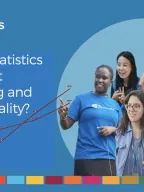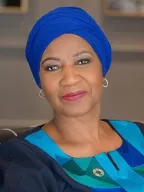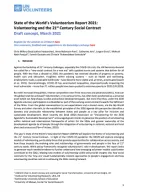What would volunteering look like under a feminist social contract?
About the discussion group
In this discussion, we seek to innovate ideas for an alternative vision of volunteering under a feminist social contract.
The 2021 State of the World’s Volunteerism Report (SWVR) will explore the theme of volunteering and the 21st Century Social Contract. In light of the COVID-19 pandemic the SWVR will explore evolving and emerging models of volunteering that provide opportunities for collaboration across states and society, and how these impact the evolving roles and relationships of governments and people in the face of 21st century needs.
But what would volunteering look like under a social contract that places women's empowerment and gender equality at its core and center? The discussion will bring together policy stakeholders (UN agencies, governments, think tanks) with women’s groups, movements, the volunteering communities and academia to discuss principles and perspectives for the upcoming 2021 State of the World's Volunteerism Report. The report aims to generate much-needed evidence to understand how different forms of voluntary participation can create meaningful ownership for those furthest left behind including women's groups and marginalised communities, reflected in policies and practice.
The discussion will culminate in a dialogue, taking place on 2 June 2021and will form part of a paper that will frame the debate on the role of volunteering under a feminist social contract.

In various posts we will share the core ideas, insights, proposals and case examples shared by the global dialogue guest speakers as well as the focus group participants. Here is the first one!
CORE IDEA SHARED BY ALL PARTICIPANTS
▪ Feminism is about consciously understanding and dismantling unfair and unjust power relations that keep women, genders groups and any other group marginalized, excluded and oppressed in diverse ways. The dismantling is done with the aim to create societies, institutions and processes that are inclusive, diverse, participatory and respectful of
human dignity and rights. Feminists work guided by the vision that doing our work is generating alternative responses that are truly recognizing everyone’s agency, voice and rights. These analytical lenses are used to assess everything: from a volunteering initiative to state-citizens relations, family norms or geopolitical power relations
What do you think?

The need to ensure volunteers are rewarded and recognized in order to tackle the challenge of volunteering as unpaid work
All the speakers and participants coincide that women and other marginalized groups are constantly carrying out extremely necessary and important work that typically is invisibilised, dismissed as less important (for example, “work of unskilled people”), taken for granted and, on top of all that, unpaid. This, many times, increases the vulnerability and burden over the shoulders of the already most disadvantaged groups, including women and other gender groups. This voluntary work relates not just with essential caring activities done at family level, but also with
social and political activities. Some activities/projects described included cooking during protests, other types of mass mobilization or consultations during peace processes, healing men coming back from war, campaigning for rights or providing educational or mental health support in community centers of the most marginalized neighborhoods/areas. In this context, feminists claim if volunteering aims not become another process worsening inequalities and reinforcing the status quo… then is necessary to do the following:
✓ Reward volunteers and people doing voluntary work. This includes financial and symbolic rewards. Financial rewards could be in the form different types of economic support -for example, allowances, other types of income and core organizational support for their organizations-; supporting the advocacy for universal basic income (recognizing
the financial value of unpaid work done by women and other groups). Symbolic rewards include, for example, certificates, celebration of participation of people of every caste, religion, gender or race; public acknowledgment of the work done by multiple identities’
groups, etc. If rewarding is not done, then voluntarism becomes entangled with institutions reproducing the extractive and exploitative capitalist model, rather than being an opportunity for liberation.
What do you think?

Another core idea agreed by all participants was:
A feminist approach to volunteering, Recognizes and respects from the start the agency and power of every individual and organization participating in a social project, including a volunteering one. This means generating spaces for empathy, recognition of talents and needs of volunteers and communities. This also means listening and collaboration considering every person/community unique capabilities
How is your organization recognizing and celebrating volunteers' role?
Discussion Moderators


Discussion Members


How to join
Share your questions, ideas and experiences! To join the discussions, simply:
- Create a user account here
- Once your account has been activated, log in here (Please make sure to check your spam).
- Then go this discussion forum
- Select the second tab, 'Discussion' to leave a comment and engage with other participants.
- For any technical issues, contact us here





I'm Katrina Borromeo, Programme Specialist at UNV, and I'm delighted to be moderating the consultation with my colleagues Jane Muthumbi and Cecilia Milesi.
This consultation will run for three weeks so there's plenty of time to get involved and do a deep-dive in some emerging themes such as:
✔ Volunteering as unpaid work, (with its consequences for women empowerment). For example, how co-production in social services, social protection and participation in policy-making as mainly unpaid activities impacts differently in women and other gender groups? In all, based on your experiences, how are issues on unpaid care work, women’s role in safety nets etc. and the work burden impacting the roles of women, men and other gender groups in co-producing social services? Please provide ideas and examples for change.
✔ Volunteering as a mechanism to promote gender equality and rights (or otherwise. For example, based on your experiences, how can new forms of governance better amplify women and other gender groups’ voices in strategic decision and policy-making? Please provide ideas and examples.
✔ Power-sharing in the volunteering sector. For example, how historic asymmetries and the unfair distribution of resources among countries and organizations affects social innovation? Please provide ideas and examples for change.
✔ Volunteering for Social innovation: Based on your experiences, how do gender issues linked to innovations around gender norms, or the acceptance and (lack of) recognition of ideas particularly coming from women’s groups and collectives affecting the capacities and opportunities of women and other gender groups to innovate? Please provide ideas and examples for change"
To be able to leave a comment, make sure you have created a user account (see more instructions in the tab 'How to join").
Looking forward to hearing your ideas and responses!